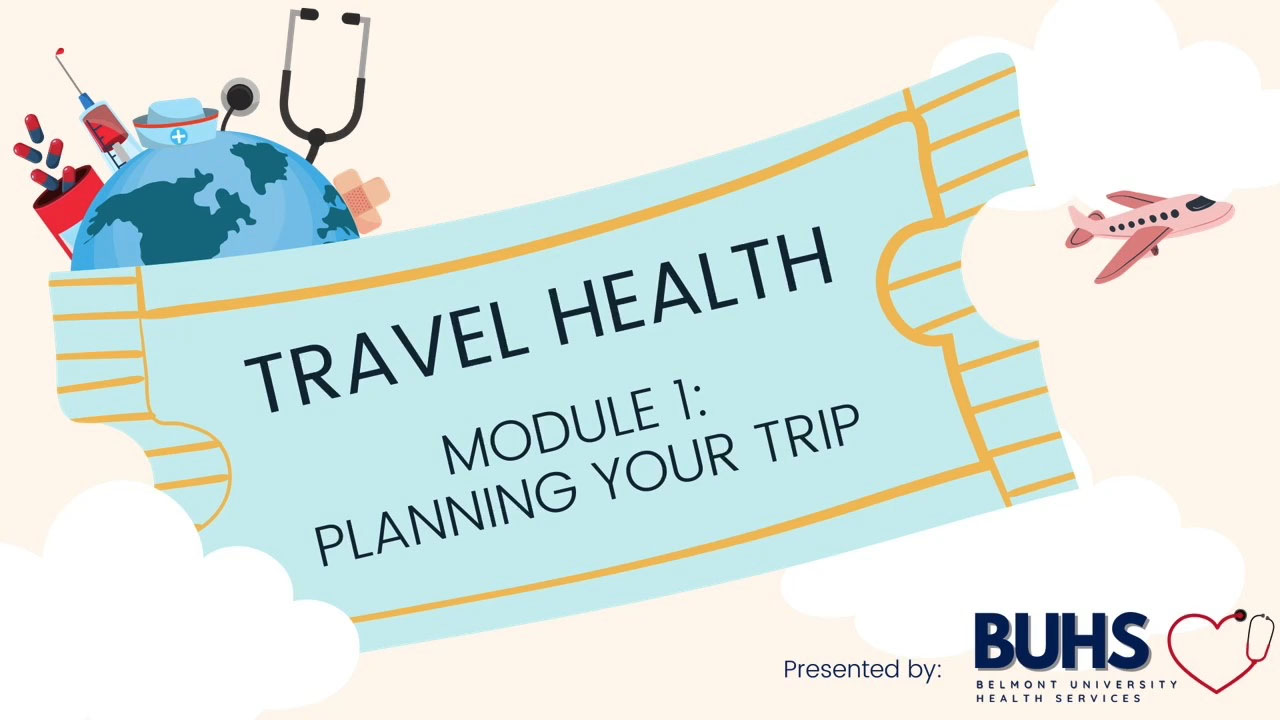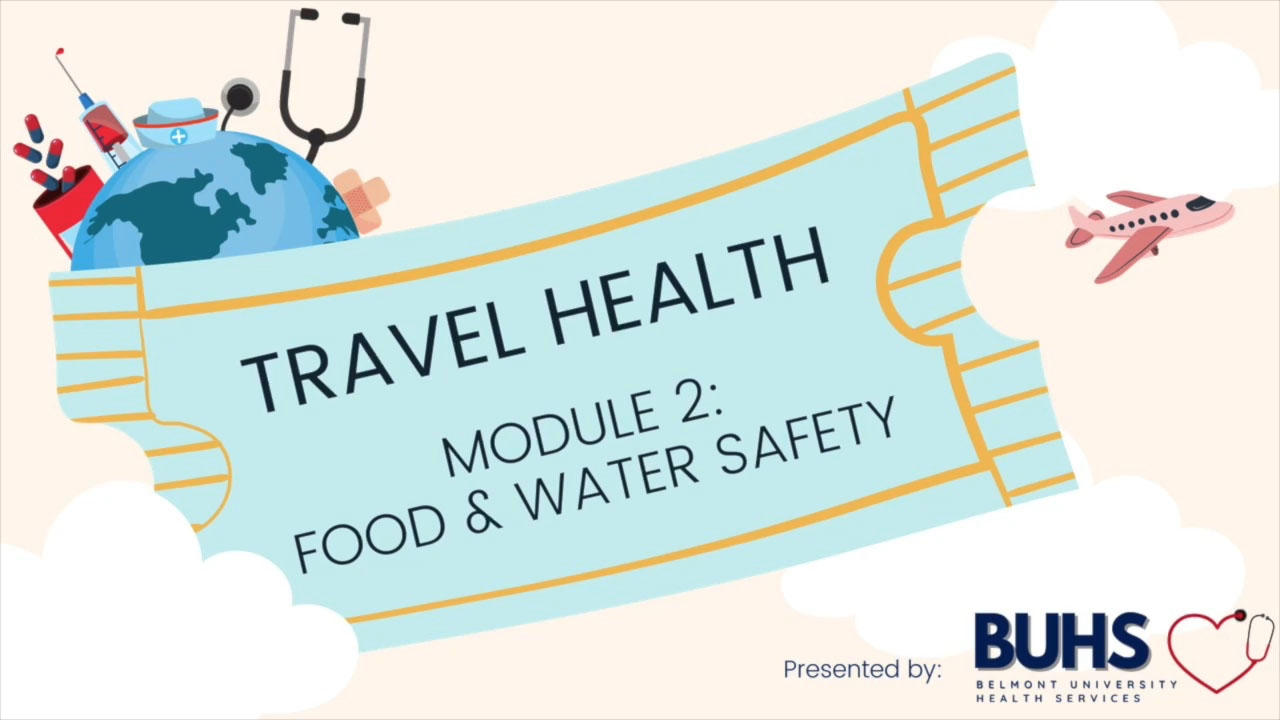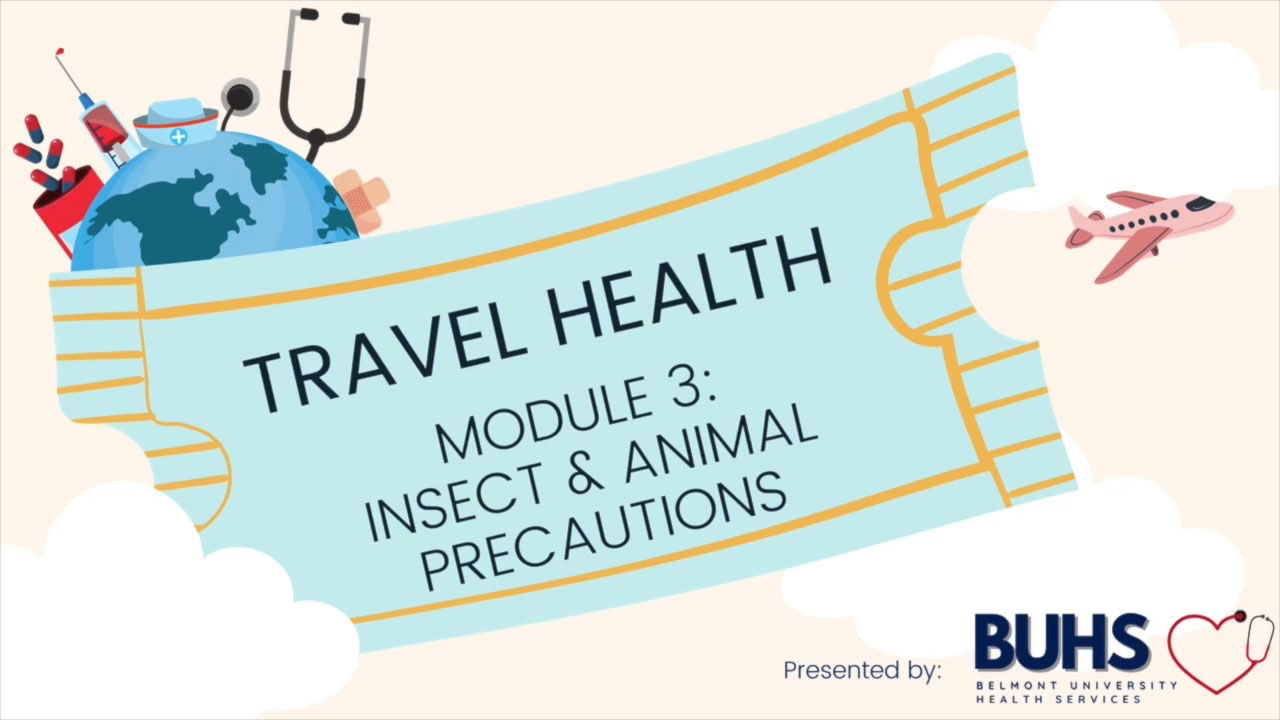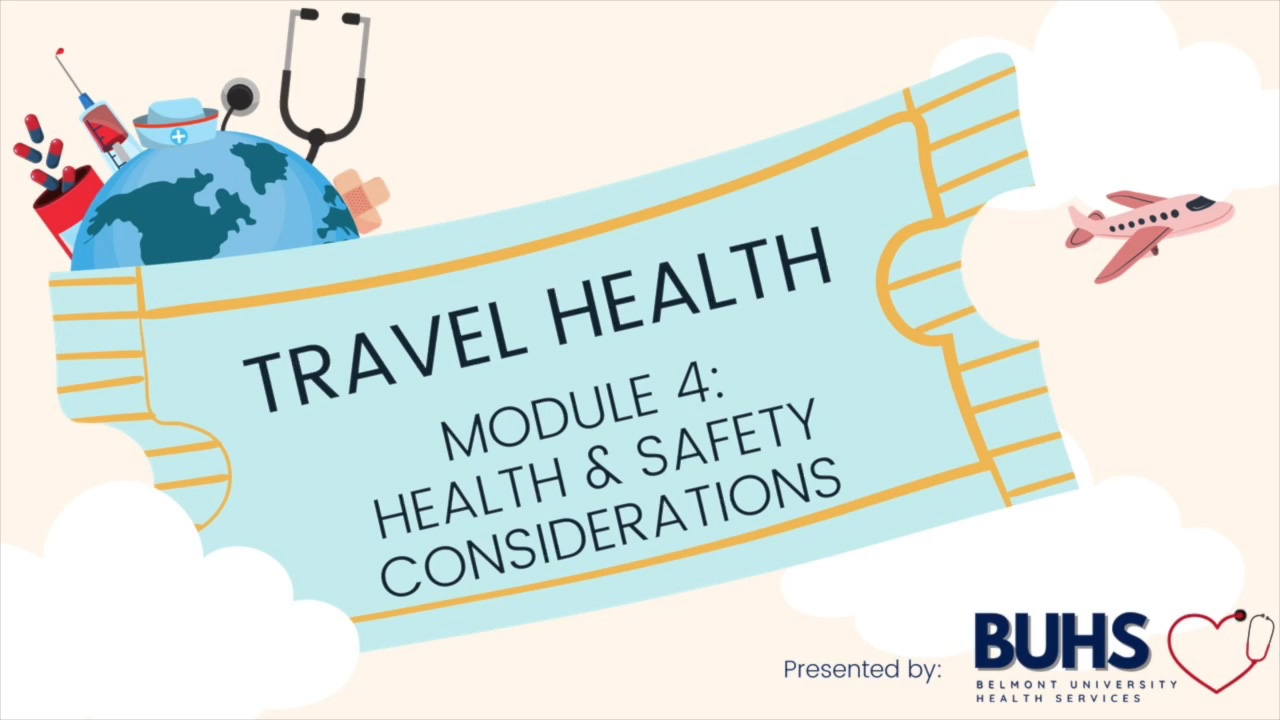The Travel Clinic’s goal is to ensure Belmont travelers are prepared with appropriate health and safety information, immunizations and medications to help reduce the risk of illness and injury related to international travel. Services are available to all current students, faculty and staff.
We provide an individual assessment of your personal risks based on your trip. Your medical history, scheduled destinations and types of activities will be reviewed by a Travel Health Provider who will send you recommendations for immunizations and medications to help reduce the risk of illness and injury related to travel.
*Please note that some travel vaccines can take up to a month to complete and in times of high demand (typically a few weeks before Spring Break and the last month of the Spring Semester), it may take us longer to get your recommendations to you. Please plan ahead when possible and start this process 1-2 months before your departure.
Questions? Contact us at healthservices@belmont.edu or 615-460-6194
Follow these steps to get started
Step 1: Review the Travel Health Video Modules below which contain important information and are less than 10 minutes each.
Step 2: Complete a Pre-Travel Intake Form located under FORMS in your Belmont Health Portal. Note: Have your immunization history and trip details handy while completing this form!
Step 3: Once the Pre-Travel Intake Form has been received, a Health Services travel health provider will review your form and send personalized recommendations for immunizations, medications, and over-the-counter products. These recommendations will be sent as a secure message to your Belmont Health Portal. To view, login to your Health Portal and click on the MESSAGES tab.
Step 4: Once you have reviewed your recommendations, you can self-schedule a travel phone consult with a travel provider in your Belmont Health Portal under the APPOINTMENTS (Appts) tab. A travel health provider will answer any questions you have about the information in the videos or in your Travel Health Recommendations. Your provider will also let you know when you can pick up your prescriptions and/or receive your immunizations.
*If you are unable to find a Travel Phone Consult appointment that works for you in self-scheduling, please email us at healthservices@belmont.edu and we will be happy to find a time that works for you.
COST: Travel Recommendations and Travel Phone Consult Appointments are free for Belmont students, faculty, and staff. Prescriptions may be filled at the Belmont Pharmacy or the pharmacy of your choice.
NEW: Health Services and Pharmacy may now be able to bill your insurance for travel vaccines. In order to bill insurance, extra time is required, and you must first schedule a Travel Phone Consult.
Co-pays for medications and vaccines are due to the pharmacy at the time of pick up or to Belmont Health Services Clinic when immunizations are administered. Note that these charges may not be billed to your student account.
If you prefer, you can choose to obtain the recommended prescriptions or immunizations at the pharmacy or travel health provider of your choice.
Resources
If you are a US citizen, register with the Department of State’s Smart Traveler Enrollment Program. You will receive important information from the Embassy about safety in your intended destination. STEP also helps friends and family members reach you in case of emergency.
All students who are participating in long-term programs are required to have international healthcare coverage for the duration of their study abroad program. This is not optional. Students are enrolled through their program provider (Arcadia or SAI) or through Belmont arranged insurance. If you are traveling with a group not affiliated with Belmont, check with your current plan to see what is available internationally. If further coverage is needed, the following companies have plans for purchase:
Travel links/apps that are helpful for country specific updates and tips:
- International SOS (fee required)
- Belmont Travel Abroad
- Crisis Awareness and Preparedness
- CDC Travelers' Health
- Timeshifter (helps with jet lag)
- Transportation Security Administration (TSA) Traveler Information
- American Red Cross (first aid references)
- US Foreign Embassy
For vaccine pricing and availability in our clinic, please see the list under "immunizations" on our medical services page
Tetanus/diphtheria (Td) or Tetanus/diphtheria/acellular pertussis (Tdap): once every 5-10 years
Measles/Mumps/Rubella (MMR): two lifetime doses
Hepatitis A: recommended for most foreign travel and is a two shot series
Hepatitis B: recommended for travel and is a three-shot series
Influenza: recommended yearly vaccination
Varicella (chickenpox): recommended and is a two shot series or history of the disease
Polio: additional booster might be required for travel
Typhoid: recommended for certain areas of travel
Yellow fever: recommended for certain areas of travel (not available at Belmont at this time)
COVID-19: recommended for all travel and might be required for some destinations
Insect repellent you apply to skin: DEET
DEET is available in many strengths. For travel, it is recommended that you use 20-35% DEET products. Apply per the manufacturer's recommendations and avoid eyes and mouth. Make sure to wash DEET off after coming indoors. Remember that if you are using sunscreen, apply it first and let it absorb fully before applying DEET.
How to apply DEET properly here.
Insect repellent you apply to clothing: Permethrin
You can purchase clothing that is pretreated with permethrin, or you can spray it onto clothing to stop mosquitos and ticks. You should carefully follow these guidelines when treating your clothes. Permethrin can be used on tents, backpacks/bags, bedding, or netting for extra protection. Note that if you buy pretreated clothing or spray permethrin on your own items, you will need to wash insect-repellent clothing separately from all your other laundry.
How to properly apply permethrin here.
Traveler’s diarrhea is a common occurrence and is seen in 40%-60% of people. It normally occurs in hot and humid areas. It is cause by bacteria, viruses and parasites. You can get sick from drinking untreated water or by eating foods that have been rinsed in this water. Tips to reduce your risk:
- Drink only bottled water, use water purification tablets, or boil water for 3 or more minutes before consuming
- Use bottled water for brushing teeth and keep mouth closed while showering
- Avoid locally made ice and wipe the tops of cans/bottles before consuming
- Avoid food prepared by street vendors
- Consume fruits and vegetables that can be peeled
- Avoid buffets and/or room temperature sauces and eat meals that foods that are cooked and served hot
- Make sure eating utensils are clean and dry
- Wash hand often
Traveler’s diarrhea can have a sudden onset and occur more than once during your trip. Signs and symptoms include:
- Nausea and vomiting
- Cramping
- Watery, loose stools
For any level of signs of diarrhea, treatment can include:
- Oral electrolyte salts – sip slowly and increase volume of fluid based on amount of fluid lost
- Loperamide (Imodium) – take two 2mg tablets after the first loose stool. Can take another tablet after subsequent stools, but do not take more than four tablets in 24 hours. Do not use if bloody diarrhea or fever is present.
For severe diarrhea (defined as more than 3 loose stools in 8 hours), prescribed medication is required. Seek medical attention if diarrhea does not respond to antibiotics, blood is present, or fever is more than 102 degrees F.
- Azithromycin 500mg: take one tablet by mouth daily for 1-3 days until diarrhea has resolved. Loperamide may be taken at the same time.
- Ciprofloxacin 750mg: take one tablet by mouth at onset of diarrhea. Loperamide may be taken at the same time.
Altitude sickness (acute mountain sickness) can occur when climbing or walking at higher altitudes without giving your body time to adjust. Mild symptoms include headache, nausea, fatigue, shortness of breath, and difficulty sleeping. Moderate symptoms include tightness in your chest, difficulty walking, and trouble completing regular activities. Severe symptoms such as confusion, inability to walk, and shortness of breath even when resting. This is an emergency and requires immediate medical attention.
Talk to your provider during your travel consult to see if you need medications to help with altitude sickness based on your itinerary.
TimelyCare’s TALKNOW service is accessible 24/7 to all Belmont students while traveling abroad.
To use TALKNOW internationally, the app must be downloaded prior to leaving the US. Customer Support can be reached by phone at (833) 484-6359 if you have any difficulty accessing the app once abroad or prior to leaving.
TALKNOW provides immediate access to a mental health professional who can answer any questions and concerns you may have. The average wait time to be connected is only 3 minutes. All conversations are free and confidential.
When traveling abroad with medication, it is essential to be informed about the regulations and requirements of your destination. The CDC's travel guide (cdc.gov) provides valuable information on how to safely carry medications, including recommendations on prescriptions, over-the-counter drugs, and controlled substances.
Similarly, the International Association for Medical Assistance to Travellers (IAMAT) offers useful advice (iamat.org) on traveling with medications, including tips on carrying documents, understanding local laws, and ensuring medication access while abroad. These resources can help travelers plan and prepare for a safe, stress-free journey with their necessary medications.
This IAMAT resource (iamat.org) is a valuable guide for travelers with medical conditions, providing essential tips and information to ensure a safe and comfortable journey. It offers advice on managing chronic health issues while traveling, including how to prepare for medical emergencies, access healthcare abroad, and navigate local medical systems. It also provides helpful recommendations on carrying medications, understanding potential health risks in different regions, and preparing for unforeseen health challenges.
This IAMAT resource (iamat.org) is an excellent guide for travelers managing mental health conditions. It offers practical advice on preparing for travel while maintaining mental well-being, including how to manage stress, anxiety, or other mental health concerns in unfamiliar environments. It also highlights the importance of carrying necessary medications, understanding how local healthcare systems can support mental health needs, and recognizing potential triggers when abroad.
Clinic Hours
Saturday – Sunday: Closed
*Hours may differ during school breaks or holidays.
Contact Us
Phone: 615.460.5506
Fax: 615.460.6131
Email: healthservices@belmont.edu





